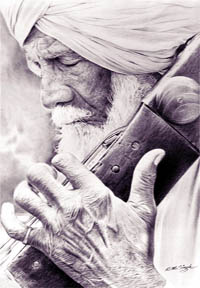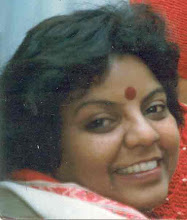FOLK FOR FUTURE
Our soul-stirring folk songs are often born out of struggle. Now, these folk music traditions, like Punjab’s Jugni, are being reinvented to connect them to GenNext and how! Nirupama Dutt takes a look
Our soul-stirring folk songs are often born out of struggle. Now, these folk music traditions, like Punjab’s Jugni, are being reinvented to connect them to GenNext and how! Nirupama Dutt takes a look
MUSIC is indeed the food for love, as Baba Shakespeare indicated. It is played on not just for love but also for struggle, messaging and change, as the SMS generation would put it. Folk music, a part of the collective consciousness, has the power to connect thousands by just the striking of a few notes or singing out of a verse and it has been a vibrant medium always for the songs of struggle.
 Ol' Man River was adapted by the Bard of Brahmaputra, Bhupen Hazarika, to the native conditions in the song,“Oh Ganga behti ho kyun” |
In America, folk music came back to the people’s psyche in the 20th century as workers struggled for child labour laws and drew upon the spirituals that came from the slave fields. Once again, as we are 11 years into the 21st century, the bars, cafes and clubs see the conscious Americans singing for peace as Bush or Obama have made wars. Interestingly, Ol' Man River, a 1927 song from the musical Show Boat, that sang of African-American hardships and the uncaring flow of the Mississippi River, was adapted by the Bard of Brahmaputra, the late Bhupen Hazarika, to the native conditions in his rendering for the teeming millions living below the poverty line in the song: Oh Ganga Behti Ho Kyun.
India, however, has a very long tradition, given the long history of its civilisation, of messages spread through music that connects people. The Indian folk repertoire is vast and varied given the diversity of the country and its people. In fact, many of the numbers in the popular charts have an interesting history. One Punjabi song of Karachi’s Coke Studio, Season 3, which has been on top of the charts for over a year, is the Jugni fusion number by Arif Lohar and Meesha Shafi, with the alluring intervention of Dum Gutku. It may just be thought of as the age-old narrative device used in Punjabi folk music where Jugni is used as an observer of events. Others may consider Jugni to be a synonym for a young, pretty lass. However, the oral history that has been recorded by freedom fighters and scholars points out that Jugni, which is so much a part of the Punjabi folk repertoire, came into being only in 1906 and was actually a song of protest against the British imperial rule. That year, a flaming torch toured all over the British empire in celebration of the golden jubilee of Victoria Regina. When it came to Punjab, a pair of young singers, Manda and Bishna, fond of singing tappe and the legend of Mirza, decided to sing the song of the natives and the word ‘Jugni’ was derived from ‘jubilee’ and the target was the jubilee flame. In fact, that’s how the rustic and unlettered youths pronounced the word. The message came out with all its satire in the verses that have the names of the different destinations the jubilee flame was taken to and here is the one on Majitha:
 Jugni jaa varhi Majithe
Jugni jaa varhi Majithekoi rann na chakki peethe
Putt gabhru mulak vich maare
rovan akhiyan par bulh si seete
Piir mereya oye Jugni ayi aa
ehnan kehrhi jot jagaee aa
(The Jugni has reached Majitha, where no woman grinds corn, young men of the country were killed, eyes wept but lips her sealed, My Master the Jugni has come here, what kind of flame is it?)
Writer Karamjit Singh Aujla writes, quoting oral records: "From city to city, Jugni, alias jubilee, went, Bishna and Manda followed and huge crowds gathered. Anger against the oppression rose, and the people became restless. The police arrested Bishna and Manda at Gujranwala and that was the last that was heard of them." There is no document of the Mirasi Manda and Jat Bishna being killed because those times did not necessitate the invention of fake encounters. However, oral histories recount the story of these two unsung lads of Punjab.
The many songs in different languages of India’s freedom movement are well known and the Indian People’s Theatre Association (IPTA) had a rich repertoire and many of the songs are still sung. Musicologist Sumangla Damodran, who has documented the revolutionary legacy of the IPTA songs, says: "The protest music tradition in India is largely not documented in any systematic manner. The formation of IPTA in the early 1940s marked a formal adoption of the idea that music and theatre would be used for the conscious articulation of protest. What emerges clearly from a random look at the songs that are available in several Indian languages is the range of styles used as well as experiments in terms of both form and content."
Going back in time, the verses sung by the bhakti poets became the architects of a caste and class-ridden society crying out for social justice, freedom from prejudice and love that transcends all differences. The earliest of the bhakti or path of devotion saints originated in the South as early as 5th century AD. Ramanuja (1017-1137) was the one who influenced Vaishnav Bhakti but north India saw its greater evolved form from the 14th to the 17th centuries, with Bhakti poets like Ravidas, Chaitanya Mahaprabhu, Kabir, Namdev, Meera Bai, Tukaram and others. This was the time when Guru Nanak (1469-1539) laid the beginnings of the Sikh faith and it also coincided with Sufi saints reaching out to the people with a similar message of shunning caste and creed. A happy coming together of the Sufi and Vaishnav thought in its soulful singing by the wandering minstrels of Bengal, the Baul singers.
 The rendering of Bulleh Shah’s verse by Rabbi Shergil has a new-age feel that has even the jet-set crowd tapping its feet Photo: Pradeep Tewari |
Punjab had a rich collage of Sufi poets, beginning with Sheikh Farid and going on to valuable contributions from Sultan Bahu, Shah Husain and Bulleh Shah. It is in Bulleh Shah (1680 to 1757) that Sufi mysticism is celebrated to the hilt, just as a Punjabi would do: Bulleah ki jaana main kaun:
Not a believer inside the mosque, am I
Nor a pagan disciple of false ritesthe pure amongst the impure
Neither Moses, nor the Pharaoh! to me, I am not known.
When sung by Rabbi Shergil, this verse has the power to get even the jet-set crowd to tap its feet. "In fact, everyone is on the Sufi bandwagon in Punjab and outside, but this is a great tradition that has to be understood in spirit and not taken as a mere fad," says Kamal Tewari, chairperson, Chandigarh Sangeet Natak Akademi. He adds: "Music and social change have always gone hand in hand through the centuries. Who could have professed social change as vocally and as sincerely as Kabir did? Kabirvani still plays the role to connect people." Love, despair and joy, or struggle and protest, name the emotion and music is its food. Indeed, some of our sweetest songs, a la poetP.B. Shelley, have a sad history in ways more than one.
Udasi unplugged
|
Mother Earth! Many more moons to your lap
Keep shining O’ bright sun on the tenements of the labourers — Sant Ram Udasi  Songs of struggle never end because strife is an integral part of human existence and as far as lyrics that have enjoyed immense popularity in post-Independence Punjab go, they belong to Sant Ram Udasi (1939-1986). Udasi was born in a Dalit Mazhbi Sikh landless labour family. He grew up with a strong Dalit consciousness and his poetry blossomed in the Left-wing political stage. His songs are sung all through Punjab, as they call for justice to workers, poorest of the poor and women. In recent times, a new dimension was given to his songs by Dalit activist Bant Singh, who lost both his legs and arms for fighting for justice after the rape of his 17-year daughter. Young Bant, who belonged to a family of Mazhabi Sikhs in Jhabbar village of Mansa district in the Malwa region of Punjab, sings the songs of Udasi, who influenced him greatly in his youth. "They maimed me but could not silence me, for I sing still," says this Dalit icon. Songs of struggle never end because strife is an integral part of human existence and as far as lyrics that have enjoyed immense popularity in post-Independence Punjab go, they belong to Sant Ram Udasi (1939-1986). Udasi was born in a Dalit Mazhbi Sikh landless labour family. He grew up with a strong Dalit consciousness and his poetry blossomed in the Left-wing political stage. His songs are sung all through Punjab, as they call for justice to workers, poorest of the poor and women. In recent times, a new dimension was given to his songs by Dalit activist Bant Singh, who lost both his legs and arms for fighting for justice after the rape of his 17-year daughter. Young Bant, who belonged to a family of Mazhabi Sikhs in Jhabbar village of Mansa district in the Malwa region of Punjab, sings the songs of Udasi, who influenced him greatly in his youth. "They maimed me but could not silence me, for I sing still," says this Dalit icon.Sant Ram Udasi’s songs, popularised by (L) Bant Singh, call for justice to the poor |
